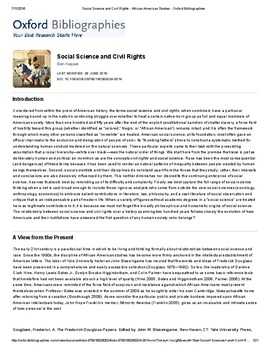| dc.description.abstract | Considered from within the prism of American history, the terms social science and civil rights, when combined, have a particular meaning bound up in the nation’s continuing struggle over whether to treat a certain native-born group as full and equal members of American society. More than one hundred and fifty years after the end of the explicit constitutional sanction of chattel slavery, a force field of hostility toward this group (whether identified as “colored,” Negro, or “African American”) remains intact, and it is often the framework through which many other persons classified as “nonwhite” are treated. American social science, at its foundation, most often gave an official imprimatur to the exclusion and denigration of people of color. Its “founding fathers” strove to construct a systematic method for understanding human conduct modeled on the natural sciences. These particular experts came to their task with the preexisting assumption that a racial hierarchy—white over black—was the natural order of things. We start here from the premise that race is just as deliberately human and political an invention as are the concepts civil rights and social science. Race has been the most consequential (and dangerous) of these terms because it has been used to render as natural patterns of inequality between people created by human beings themselves. Second, social scientists and their disciplines do not stand apart from the forces that they study; rather, their interests and conclusions are also decisively influenced by them. This neither diminishes nor discredits the continuing enterprise of social science; it serves that work best by reminding us of its difficulty and complexity. Finally, we best capture the full range of social science thinking when a net is cast broad enough to include those rigorous analysts who come from outside the core social sciences (sociology, anthropology, economics) to embrace salient contributions in literature, law, philosophy, and a vast literature of social observation and critique that is an indispensable part of modern life. When a variety of figures without academic degrees in a “social science” are treated here as legitimate contributors to it, it is because we must not forget the broadly philosophical and humanistic origins of social science. The relationship between social science and civil rights over a history spanning two hundred years follows closely the evolution of how Americans and their institutions have answered the first question of any human society: who belongs? | |
